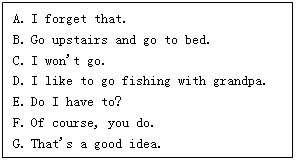
题目列表(包括答案和解析)
Almost every Chinese person can recite(背诵) the two lines of the famous poem, “Every grain on the plate comes from hard work ”. But sadly, many of us don’t actually get the real meaning of these lines: Don’t waste food.
A CCTV program reported that the food Chinese people throw away every year is enough to feed 200 million people for a year. Do we have too much food? Absolutely not. According to the UN World Food Program, there were 925 million hungry people around the world in 2011, especially in developing countries. Six million children die of hunger every year.
Chinese people are well-known for being friendly and generous. Many even feel that they lose face if their guests have eaten all the food on the table. Luckily, a number of people have realized the importance of saving food. What should we do in our daily lives to waste less food?
1. Don’t order too much in a restaurant. Only order as much as you want to eat. If you cannot eat all the food you ordered, take the rest of it home.
2. Don’t leave any food in your bowls while having meals.
3. Keep an eye on what food you have at home. Don’t buy too much, especially for vegetables and fruit.
【小题1】What’s the real meaning of the underlined sentence?
| A.春种一粒粟,秋收万颗籽。 | B.谁知盘中餐,粒粒皆辛苦。 |
| C.吏禄三百石,岁晏有余粮。 | D.足蒸暑土气,背灼炎天光。 |
| A.6 million. | B.925 million. | C.200 million. | D.725 million. |
| A.Order more food in a restaurant. |
| B.Every time you eat, leave some food in your bowls. |
| C.Take all the food you ordered home. |
| D.Don’t store too much food like vegetables and fruit. |
| A.A number of people have realized the importance of saving food. |
| B.The food Chinese people throw away every year is enough to feed 200 million people for a year. |
| C.200 million children die of hunger every year. |
| D.Many Chinese feel that they lose face if guests have eaten all the food on the table. |
| A.Don’t waste food. |
| B.Chinese people are friendly and generous. |
| C.We can’t die of hunger. |
| D.Every grain is grown by farmers. |
Almost every Chinese person can recite(背诵) the two lines of the famous poem, “Every grain on the plate comes from hard work ”. But sadly, many of us don’t actually get the real meaning of these lines: Don’t waste food.
A CCTV program reported that the food Chinese people throw away every year is enough to feed 200 million people for a year. Do we have too much food? Absolutely not. According to the UN World Food Program, there were 925 million hungry people around the world in 2011, especially in developing countries. Six million children die of hunger every year.
Chinese people are well-known for being friendly and generous. Many even feel that they lose face if their guests have eaten all the food on the table. Luckily, a number of people have realized the importance of saving food. What should we do in our daily lives to waste less food?
1. Don’t order too much in a restaurant. Only order as much as you want to eat. If you cannot eat all the food you ordered, take the rest of it home.
2. Don’t leave any food in your bowls while having meals.
3. Keep an eye on what food you have at home. Don’t buy too much, especially for vegetables and fruit.
1.What’s the real meaning of the underlined sentence?
A.春种一粒粟,秋收万颗籽。 B.谁知盘中餐,粒粒皆辛苦。
C.吏禄三百石,岁晏有余粮。 D.足蒸暑土气,背灼炎天光。
2.According to the UN report, how many hungry people were there in 2011?
A.6 million. B.925 million. C.200 million. D.725 million.
3.What should we do to waste less food?
A.Order more food in a restaurant. B.Every time you eat, leave some food in your bowls.
C.Take all the food you ordered home. D.Don’t store too much food like vegetables and fruit.
4.Which of the following is NOT true?
A.A number of people have realized the importance of saving food.
B.The food Chinese people throw away every year is enough to feed 200 million people for a year.
C.200 million children die of hunger every year.
D.Many Chinese feel that they lose face if guests have eaten all the food on the table.
5.What’s the main idea of this passage?
A.Don’t waste food. B.Chinese people are friendly and generous.
C.We can’t die of hunger. D.Every grain is grown by farmers.
从方框中选择恰当的选项,补全对话。(有两项多余)
A: Mary, it's your bed time. 1
B: Oh, Mum! 2 It's Friday evening and it's still early.
A: Yes. Tomorrow we have to get up early to catch the train to your grandpa's.
B: 4 OK, I'll go to bed right now. 3 Oh, Mum, do I have to brush my
teeth before I go to sleep?
A: 5 And don't forget to close the bedroom window.
B: I won't. Good night, Mum!
A: Good night!
湖北省互联网违法和不良信息举报平台 | 网上有害信息举报专区 | 电信诈骗举报专区 | 涉历史虚无主义有害信息举报专区 | 涉企侵权举报专区
违法和不良信息举报电话:027-86699610 举报邮箱:58377363@163.com